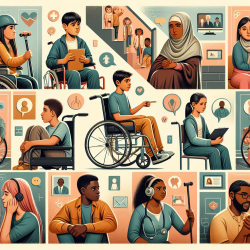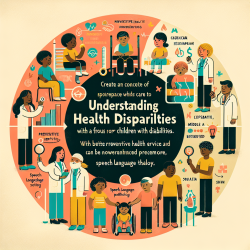Introduction
In a world where mental health is increasingly coming to the forefront, a recent scoping review sheds light on a critical, yet often overlooked population: adolescents and young adults with childhood-onset physical disabilities. The research, titled Mental health problems among adolescents and young adults with childhood-onset physical disabilities: A scoping review, highlights the mental health challenges faced by this group and calls for integrated models of service delivery.
Understanding the Data
The study reviewed 33 peer-reviewed articles focusing on conditions such as cerebral palsy, juvenile arthritis, and spina bifida. Alarmingly, the most common mental health issues identified were depression and mood-related difficulties (73%), anxiety (39%), and social/behavioral issues (33%). These findings underscore the urgent need for mental health assessments and interventions tailored to this population.
Key Findings
- There is a significant variation in reported rates of mental health problems, highlighting the need for standardized assessment tools.
- Integrated models of service delivery are crucial for addressing the mental health needs of young people with physical disabilities.
- There is a lack of consensus on best practices for assessing and reporting subclinical symptoms and psychiatric conditions.
Implications for Practitioners
For practitioners, these findings emphasize the importance of adopting a holistic approach to therapy that integrates mental health services with physical rehabilitation. Here are some actionable steps:
- Implement Integrated Care Models: Develop and advocate for service delivery models that integrate mental health and physical rehabilitation services.
- Use Standardized Assessment Tools: Employ consistent and validated tools for assessing mental health to ensure reliable data collection and intervention planning.
- Focus on Early Intervention: Identify and address mental health issues early to prevent long-term consequences.
Encouraging Further Research
The review also highlights methodological gaps, such as inconsistencies in mental health assessments. Practitioners are encouraged to contribute to research efforts that aim to fill these gaps, thereby enhancing the quality of care provided to this vulnerable population.
Conclusion
As practitioners, our role extends beyond therapy sessions. By understanding and addressing the unique mental health challenges faced by adolescents and young adults with physical disabilities, we can significantly improve their quality of life. Let's commit to making data-driven decisions and advocating for integrated care models that meet the comprehensive needs of our clients.
To read the original research paper, please follow this link: Mental health problems among adolescents and young adults with childhood-onset physical disabilities: A scoping review.










